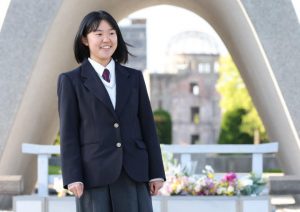One year after G7 Hiroshima Summit, “achievements” in question, Part 5: Seeds of succession
May 23, 2024
Young people who experienced event take action toward peace
English guide work, nuclear disarmament discussions
by Minami Yamashita, Staff Writer
Hana Akashi, 16, a first-year student at Funairi High School who lives in Hiroshima’s Minami Ward, said, as she stood on the same site she did that day, “I still clearly remember the scenery and how nervous I felt.” On May 19 last year, the summit meeting of the G7 (Group of Seven industrialized nations) got underway. When all the leaders of the participating nations, including those representing nuclear weapons states, laid wreaths of flowers at the Cenotaph for the A-bomb Victims in Peace Memorial Park, located in the city’s Naka Ward, Ms. Akashi was the one who handed a wreath of flowers to Japan’s Prime Minister Fumio Kishida.
At the time, Ms. Akashi was a third-year student at Ujina Junior High School. Witnessing the scene of diplomacy up close with members of her student council executive committee changed her mindset. “After the summit, I had a lot of time to think about peace with the members. I realized that dialogue is most important both in our daily lives and in diplomacy,” explained Ms. Akashi. She added, “In addition to watching and listening to the news, I started to think about how to resolve problems and take action.”
This month, Ms. Akashi started working as a volunteer English-speaking guide for overseas tourists at Peace Memorial Park. Her desire to work for organizations that provide assistance to developing countries, such as the United Nations Children’s Fund (UNICEF), has also grown.
Other young people have also started to pay close attention to international affairs after being inspired by the G7 Hiroshima Summit held in their hometown. Yayano Okuda, 20, from Oita Prefecture who is now a second-year student at Hiroshima University and living in Higashihiroshima City, has applied to be part of the Peace Caravan project (made up of 15 people) established by a Hiroshima Prefecture public-private partnership called the Hiroshima Organization for Global Peace (HOPe). In November last year, over a period of eight days, she visited the United States and Canada, where she discussed nuclear disarmament and other issues with local young people.
Ms. Okuda, who is interested in the direction of security in “a world without nuclear weapons” if achieved, has settled on the issue of nuclear weapons as a topic for research upon her return to Japan. She is aiming to go on to graduate school in the United States to further her knowledge about related issues.
“The summit was a significant event in my life. I’m glad I came to Hiroshima,” Ms. Okuda said. As she spoke about the positive impact that the summit had on her, she also revealed her mixed feelings. “During the summit, Hiroshima’s recovery was one of the points of emphasis. Because it could have been interpreted to mean that Hiroshima was rebuilt to this extent despite the use of the atomic bomb on the city, I felt there was a danger that the destruction would be downplayed.”
One year ago, the leaders toured the Hiroshima Peace Memorial Museum, located in the city’s Naka Ward, and wrote messages of peace in the museum’s guestbook before laying wreaths of flowers at the Cenotaph for the A-bomb Victims. However, wars and conflicts persist today in numerous places around the world. Russia continues its invasion and attack of Ukraine and its threats to use nuclear weapons. In the Palestinian-controlled Gaza Strip, the death toll from the fighting between the Israeli military and the Islamic Hamas has exceeded 35,000 people. The United States, which adheres to its principle of nuclear deterrence, conducted a subcritical nuclear test on May 14.
Miku Oda, 18, a resident of Kure City, was on site to witness a commemorative tree planting by the G7 leaders at Peace Memorial Park when she was a third-year student at Funairi High School. She will study abroad at a university this upcoming fall in the United States, where she intends to learn about peacebuilding through the field of economics. She said, “If I can make friends regardless of where they are from, conflicts in other countries will become relatable to me on a personal level. I want to contribute to peace by creating that kind of an environment.”
After the holding of the first G7 Summit in an A-bombed city, young people have started to take action toward the future. And leaders have a responsibility to respond to the ideas of such young people.
(Originally published by May 23, 2024)








